Q&A: Why A&E units in London are set to close
- Published
Health services across London are under going a vast overhaul, with NHS trusts across the city deciding what services each hospital should offer.
On Tuesday, health bosses in north-west London are set to approve plans to close A&E units across the area and instead have trauma centres at major hospitals.
What has been proposed?
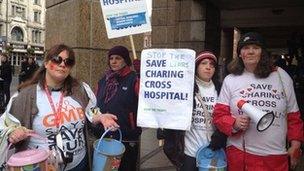
Protests have taken place against the planned changes
The recommendations, external are for four A&E departments in hospitals in north-west London to be closed.
The departments at Ealing, Central Middlesex, Charing Cross and Hammersmith hospitals would be downgraded to 24/7 urgent care centres and would no longer take "blue light patients".
Five "major hospitals" - Chelsea and Westminster, Hillingdon, Northwick Park, St Mary's in Paddington and West Middlesex - would have more specialist and experienced doctors available more of the time.
Five specialist hospitals in the area, Harefield, Mount Vernon, Royal Brompton, Royal Marsden and Royal National Orthopaedic Hospital, are not affected by the proposals.
What services will the hospitals offer?
Some hospitals already have urgent care centres which is where treatment is GP-led. They treat cases which are not quite as serious.
The hospitals would still offer things such as outpatient and diagnostic care like X-rays and physiotherapy, however they would not be able to treat life-threatening conditions such as strokes, internal bleeding and heart attacks.
"Major hospitals" will have 24/7 A&E units and would be able to undertake both emergency and elective operations; have intensive care units, psychiatric liaison, inpatient paediatrics and a maternity unit.
Why are these changes being made?
The NHS trusts say 70% of patients that go to A&E units do not need to go there, for example, if someone has a sprained ankle.
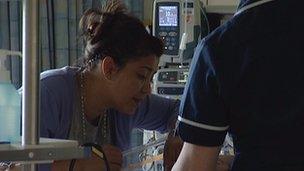
Think Tank Health 2020 said hospitals as they are have become "unsustainable" financially
Julia Manning, chief executive of Health 2020, a non-profit Think Tank, said there were many cases where people did not need to go to an A&E unit.
"The reality is we have a hospital system that has grown up unplanned, unstructured, and we have too many hospitals.
"A hospital should be a place of last resort that you go to, it shouldn't be where most people go for routine checks."
She said the hospitals as they currently are, were financially unsustainable and not safe as they could not offer "the quality of specialised care in every hospital at the bottom of people's roads".
What has the reaction been?
Local campaigners say the changes mean that they are no longer hospitals but "super GP clinics" and that it would pit "hospitals against hospital".
Ealing Council leader Julian Bell said he was "bitterly disappointed" and that the council would fight the proposals "all the way". He said the scrutiny committee was going to take it up with Health Secretary Jeremy Hunt and it would also consider a judicial review.
Save Our Hospitals campaign has raised concerns that the A&E departments that remain would not be able to cope with the increase in admissions.
And a King's Fund review , externalinto A&E waiting times said that across England, 232,000 people had waited for more than four hours to be seen, adding waiting times were the highest level for a decade.
What about the rest of London?
On Thursday, health bosses in south-west London are going to outline their recommendations for the area. Of the five hospitals, it is expected that the A&E departments in Epsom and St Helier are to close.
In south-east London, proposals to downgrade Lewisham Hospital's A&E department and to turn the maternity unit to one which is midwife-led have been met with fierce opposition with up to 15,000 people protesting against the plan.
- Published8 February 2013
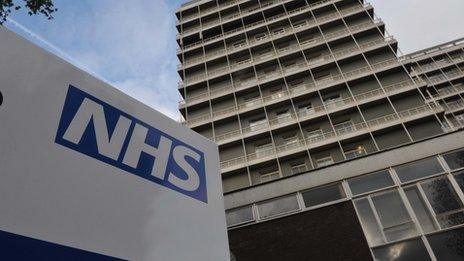
- Published31 January 2013
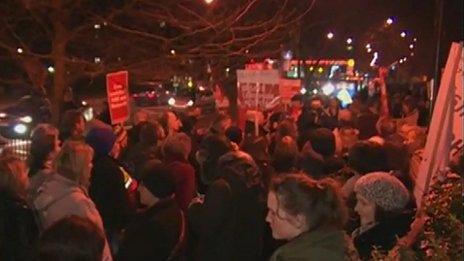
- Published20 November 2012
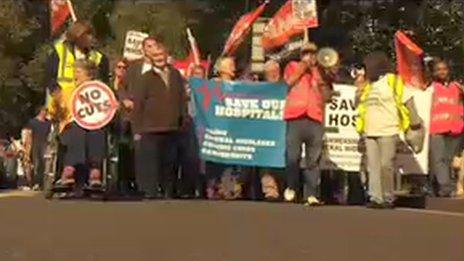
- Published6 October 2012
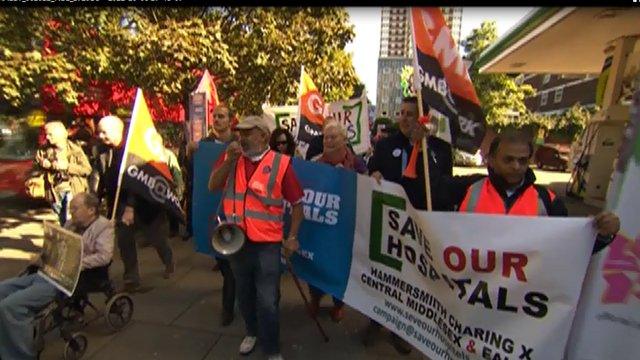
- Published21 June 2012
